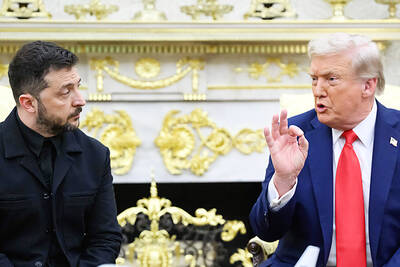Iran has told Europe's leading powers that it wants them to back its right to nuclear technology that can be used to make weapons. US officials said the move has dismayed the Europeans and strengthens Washington's push for UN sanctions against Tehran.
France, Germany and the UK have not formally responded to that demand and others contained in a wish list made available to The Associated Press.
But diplomats said Monday that Iran's conditions effectively stall the European attempt to persuade Tehran to give up the technology that would allow them to make nuclear arms, pushing Europe closer to the US view that it should be hauled before the UN Security Council for violating the Nuclear Nonproliferation Treaty.
The Iranian demands, presented in the document last week to the European powers during talks in Paris, include:
A call on the EU Three to back Iran's insistence that it have access to "advanced [nuclear] technology, including those with dual use" -- a term for equipment and know-how with both peaceful and weapons applications;
A demand that they "remove impediments" -- current sanctions -- preventing Iran from having access to such technology;
An assurance that, once the European powers make such commitments, they stick to them even if faced with "legal [or] political ... limitations" -- an apparent allusion to potential Security Council sanctions on Iran;
Agreement by the EU Three to meet Iran's conventional weapons requirements;
And a commitment to push "rigorously and systematically" for a non-nuclear Middle East and to "provide security assurances" against a nuclear attack on Iran -- both allusions to Israel, which is believed to have nuclear arms and to have destroyed Iraq's nuclear reactor in a 1981 strike to prevent it from making atomic arms.
France, Germany and the UK last year had held out the prospect of supplying Iran with some "dual use" technology, but only in the distant future, and only if suspicions that Tehran might be seeking to make nuclear weapons were laid to rest.
With Iran still under investigation, the presentation of the wish list stunned senior French, German and British negotiators, according to an EU official familiar with the Paris meeting.
Ignoring the list, the Europeans instead urged Tehran to act on their pledge to clear up nagging suspicions about their nuclear ambitions by Sept. 13, when the International Atomic Energy Agency meets to review Iran's nuclear dossier, the official said.
In London, a Foreign Office spokesman declined comment on the negotiations with Iran beyond saying that the UK was "not prepared to stand by and watch them collect the necessary technology to make a weapon."

Shamans in Peru on Monday gathered for an annual New Year’s ritual where they made predictions for the year to come, including illness for US President Donald Trump and the downfall of Venezuelan President Nicolas Maduro. “The United States should prepare itself because Donald Trump will fall seriously ill,” Juan de Dios Garcia proclaimed as he gathered with other shamans on a beach in southern Lima, dressed in traditional Andean ponchos and headdresses, and sprinkling flowers on the sand. The shamans carried large posters of world leaders, over which they crossed swords and burned incense, some of which they stomped on. In this

Near the entrance to the Panama Canal, a monument to China’s contributions to the interoceanic waterway was torn down on Saturday night by order of local authorities. The move comes as US President Donald Trump has made threats in the past few months to retake control of the canal, claiming Beijing has too much influence in its operations. In a surprising move that has been criticized by leaders in Panama and China, the mayor’s office of the locality of Arraijan ordered the demolition of the monument built in 2004 to symbolize friendship between the countries. The mayor’s office said in

‘TRUMP’S LONG GAME’: Minnesota Governor Tim Walz said that while fraud was a serious issue, the US president was politicizing it to defund programs for Minnesotans US President Donald Trump’s administration on Tuesday said it was auditing immigration cases involving US citizens of Somalian origin to detect fraud that could lead to denaturalization, or revocation of citizenship, while also announcing a freeze of childcare funds to Minnesota and demanding an audit of some daycare centers. “Under US law, if an individual procures citizenship on a fraudulent basis, that is grounds for denaturalization,” US Department of Homeland Security Assistant Secretary Tricia McLaughlin said in a statement. Denaturalization cases are rare and can take years. About 11 cases were pursued per year between 1990 and 2017, the Immigrant Legal Resource

‘RADICALLY DIFFERENT’: The Kremlin said no accord would be reached if the new deal with Kyiv’s input did not remain within the limits fixed by the US and Russia in August Ukrainian President Volodymyr Zelenskiy is to meet US President Donald Trump in Florida this weekend, but Russia on Friday accused him and his EU backers of seeking to “torpedo” a US-brokered plan to stop the fighting. Today’s meeting to discuss new peace proposals comes amidst Trump’s intensified efforts to broker an agreement on Europe’s worst conflict since World War II. The latest plan is a 20-point proposal that would freeze the war on its current front line, but open the door for Ukraine to pull back troops from the east, where demilitarized buffer zones could be created, according to details revealed by